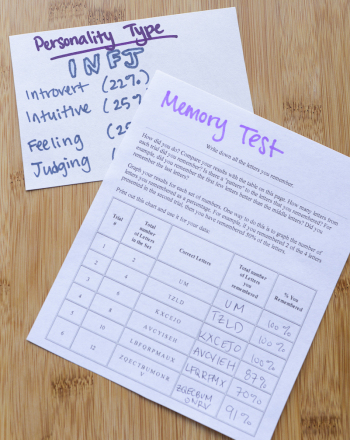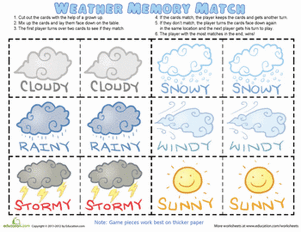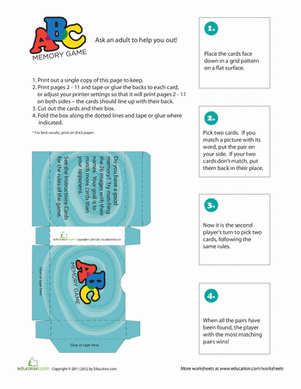Activity
Age And Memory
Memory is a person’s ability to remember information. Information is stored in either long-term or short-term memory. Short-term memory includes names of people and other information gathered on a daily basis. Long-term memory includes memories from years ago. By age 20, you begin to lose brain cells. As you age, your ability to remember things decreases.
Problem:
What is the relationship between memory and age?
Materials:
- 25 volunteers, 5 four to seven-year-olds, 5 twelve to fifteen year-olds, 5 twenty-year-olds, 5 forty-year-olds, and 5 sixty-year-olds
- computer and printer to make number cards
- 6 index cards
- Scissors
- Glue stick
- Marker
- Paper
- Pencil
- Stopwatch or timer
Procedure:
- Gather the necessary materials. Decide on the volunteers. You will test each volunteer separately.
- On the computers using the Times 36 font and size, make the following letter sequences: Z T A D L O W C L P K X J T B R Q S E R X M B R V Y N F C Q Z T X I V E A W M P F J
- Cut the letter sequences apart and glue each one on a different index card.
- Provide each volunteer with a piece of paper and a pencil. Have them write their age at the top of the paper. One at a time, test each subject’s memory by showing them one index card for 5 seconds, then ask them to write the letters they saw in order on a piece of paper. Repeat with the other 5 cards.
- Figure out the percentage of correct responses each volunteer provided. To find the percentage, divide the number of letters possible (42) by the number of letters they correctly remembered. Record the information.
- Analyze the data and draw a conclusion.
Disclaimer and Safety Precautions
Education.com provides the Science Fair Project Ideas for informational purposes only. Education.com does not make any guarantee or representation regarding the Science Fair Project Ideas and is not responsible or liable for any loss or damage, directly or indirectly, caused by your use of such information. By accessing the Science Fair Project Ideas, you waive and renounce any claims against Education.com that arise thereof. In addition, your access to Education.com's website and Science Fair Project Ideas is covered by Education.com's Privacy Policy and site Terms of Use, which include limitations on Education.com's liability.
Warning is hereby given that not all Project Ideas are appropriate for all individuals or in all circumstances. Implementation of any Science Project Idea should be undertaken only in appropriate settings and with appropriate parental or other supervision. Reading and following the safety precautions of all materials used in a project is the sole responsibility of each individual. For further information, consult your state's handbook of Science Safety.
Education.com provides the Science Fair Project Ideas for informational purposes only. Education.com does not make any guarantee or representation regarding the Science Fair Project Ideas and is not responsible or liable for any loss or damage, directly or indirectly, caused by your use of such information. By accessing the Science Fair Project Ideas, you waive and renounce any claims against Education.com that arise thereof. In addition, your access to Education.com's website and Science Fair Project Ideas is covered by Education.com's Privacy Policy and site Terms of Use, which include limitations on Education.com's liability.
Warning is hereby given that not all Project Ideas are appropriate for all individuals or in all circumstances. Implementation of any Science Project Idea should be undertaken only in appropriate settings and with appropriate parental or other supervision. Reading and following the safety precautions of all materials used in a project is the sole responsibility of each individual. For further information, consult your state's handbook of Science Safety.















